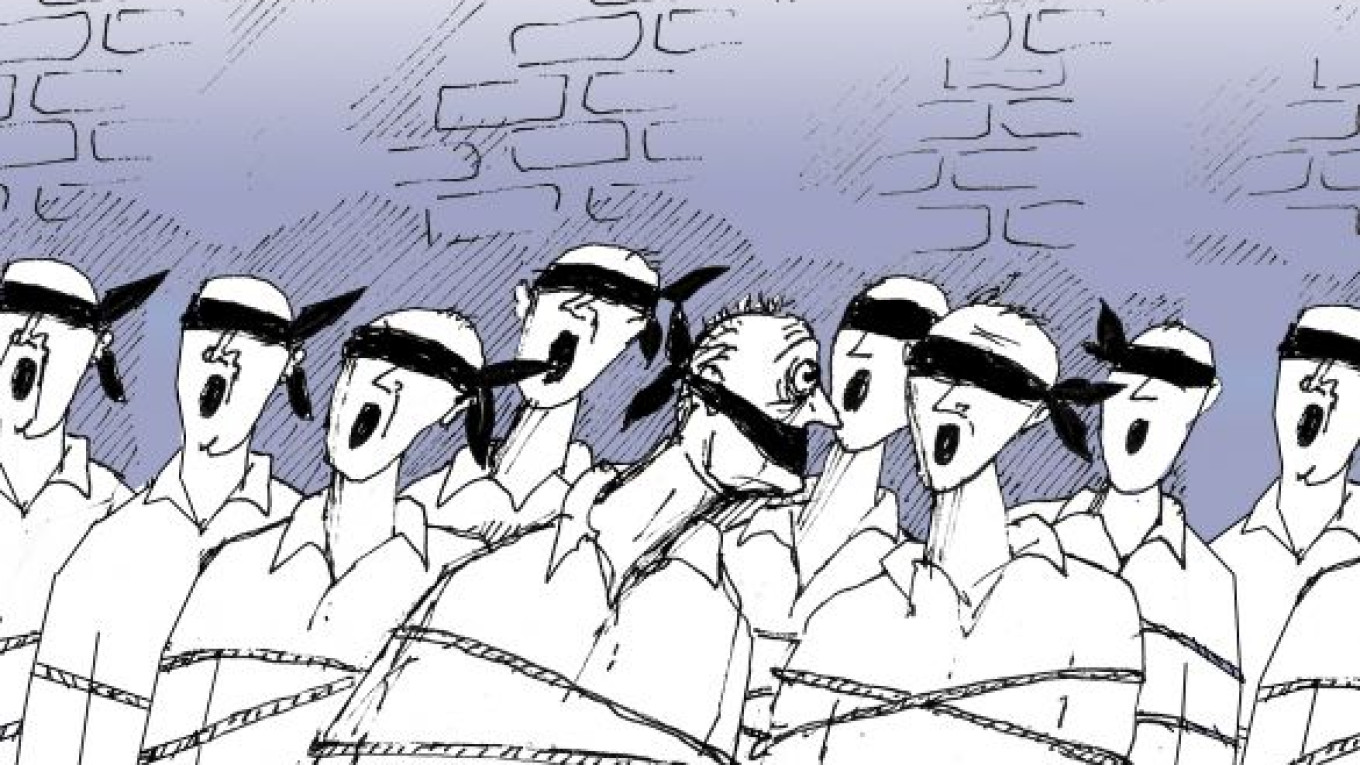For 10 years, Golos has been educating voters, analyzing electoral legislation, and monitoring elections at various levels, but only a few experts and journalists had ever heard of the organization.
But since late November, Golos, Russia’s sole independent elections observer organization, has been in the headlines of the world’s news agencies. The reason is an unprecedented harassment and intimidation campaign against Golos and its staff.
It began on Nov. 26 when government-owned newspaper Rossiiskaya Gazeta published an article accusing Golos of “reducing the process of observing the electoral campaign and voting on election day into a way of making money.”
The article seemed to be a signal. Soon Golos’ activities were the subject of an investigation by the Central Elections Commission, which ruled that continuing to gather information on violations directly during the five-day period before the elections was a violation of electoral law. The organization was fined 30,000 rubles (about $1,000).
The second blow to the organization was a film aired by NTV on Friday. This “investigative report,” which was stylistically reminiscent of crude Soviet propaganda films, accused Golos of a multitude of sins. But the most damning accusation was that it receives some of its funding from foreign donors. The film creates the impression that Golos is an agent of influence of the United States, which “traditionally opposes the current leadership” in Russia.
And then, Golos’ executive director, Lilia Shabanova, was detained at Sheremetyevo Airport on Friday on her way back from Poland where she had attended a civil society forum organized by Russia and the European Union. Customs officials demanded her notebook computer, which they suspected held some kind of mysterious “illegal software.”
Shabanova was not allowed access to legal counsel and was held for 12 hours in the transit zone of the airport until she gave them the computer. She managed, however, to copy the hard drive before relinquishing it.
The trigger that made Golos the Kremlin’s Enemy No. 1 might have been its innovative Internet project Kartanarusheniy.ru, which combines civic action with the power of Web 2.0 technology. Anyone, regardless of location, can submit information directly on the site about an alleged violation of his or her electoral rights or about violations of the electoral legislation in general.
The list of violations is depressingly monotonous. In various cities, business managers demanded that their employees vote for United Russia, threatening them with pay cuts or even dismissal if they didn’t.
During classes, teachers made their students check off United Russia on hundreds of blank ballots. Entire apartment buildings discovered that none of the residents were on voter lists.
It was also reported that none of the students, scholars or teachers at Moscow State University from outside Moscow could vote. They had to return to their hometowns to cast their ballots.
Violence was also widespread. In Belgorod, a Communist Party regional deputy was beaten up by the police. In Perm, the campaign manager for an oppositional party was beaten by unidentified men using baseball bats. In Bratsk, Irkutsk region, unidentified masked men kidnapped the 16-year-old daughter of the head of the local Communist Party branch office. They released her with a message for her mother: Quit the campaign, or we’ll kidnap her for real.
The staff of Golos doesn’t, however, believe that Kartanarusheniy.ru was the reason for the attacks. As Gregory Melkonyants, Golos’ deputy director, on his blog on Grani.ru: “We’re used to pressure. But these elections are different. The pressure is coming from the very top, starting with the United Russia convention [on Nov. 27], where Putin was nominated for president. He talked about ‘Judases’ who are ‘so-called grant recipients’ of foreign donors ‘who brief them on how to work to influence the course of the election campaign in our country.’”
Golos wasn’t the main subject of Putin’s speech. It was perhaps his most sharply worded speech since his anti-Western diatribe in Munich in 2007. Like his Munich speech, this one was based on nationalism, anti-democratic ideology and outright xenophobia.
Unfortunately, all signs suggest that after Putin physically returns to the Kremlin, the country can expect nothing but a continuation of the status quo. The essence of this status quo in Putin-speak is “stability” — the preservation of an absolute monopoly on power in the hands of a very small circle of people.
And for them, Golos and its thousands of volunteer “informants” all over the country are, indeed, Enemy No. 1.
Victor Davidoff is a Moscow-based writer and journalist whose blog is
A Message from The Moscow Times:
Dear readers,
We are facing unprecedented challenges. Russia's Prosecutor General's Office has designated The Moscow Times as an "undesirable" organization, criminalizing our work and putting our staff at risk of prosecution. This follows our earlier unjust labeling as a "foreign agent."
These actions are direct attempts to silence independent journalism in Russia. The authorities claim our work "discredits the decisions of the Russian leadership." We see things differently: we strive to provide accurate, unbiased reporting on Russia.
We, the journalists of The Moscow Times, refuse to be silenced. But to continue our work, we need your help.
Your support, no matter how small, makes a world of difference. If you can, please support us monthly starting from just $2. It's quick to set up, and every contribution makes a significant impact.
By supporting The Moscow Times, you're defending open, independent journalism in the face of repression. Thank you for standing with us.
Remind me later.


